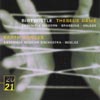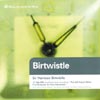Birtwistle Theseus Game; Earth Dances
A modern master continues to go from strength to strength
View record and artist detailsRecord and Artist Details
Composer or Director: Harrison Birtwistle
Genre:
Orchestral
Label: Deutsche Grammophon
Magazine Review Date: 13/2004
Media Format: CD or Download
Media Runtime: 67
Mastering:
Stereo
DDD
Catalogue Number: 477 070-2GH

Tracks:
| Composition | Artist Credit |
|---|---|
| Earth Dances |
Harrison Birtwistle, Composer
Ensemble Modern Orchestra Harrison Birtwistle, Composer Pierre Boulez, Conductor |
| Theseus Game |
Harrison Birtwistle, Composer
Ensemble Modern Harrison Birtwistle, Composer Martyn Brabbins, Conductor Pierre-André Valade, Conductor |
Composer or Director: Harrison Birtwistle
Genre:
Chamber
Label: Royal Academy of Music
Magazine Review Date: 13/2004
Media Format: CD or Download
Media Runtime: 29
Mastering:
Stereo
DDD
Catalogue Number: RAM019

Tracks:
| Composition | Artist Credit |
|---|---|
| (5) Distances |
Harrison Birtwistle, Composer
Gallimaufry Ensemble Harrison Birtwistle, Composer |
| (The) Silk House Tattoo |
Harrison Birtwistle, Composer
Adam Wright, Trumpet Harrison Birtwistle, Composer John Wallace, Trumpet Sam Walton, Percussion |
| (17) Tate Riffs |
Harrison Birtwistle, Composer
Harrison Birtwistle, Composer Royal Academy of Music Chamber Ensemble |
Author: Arnold Whittall
That second interpretation seems the most appropriate to a recording (of the work’s first performance) in which distinctions clear to the eye are far less evident to the ear. Here background and foreground, solos and ensemble, converge in a titanic struggle whose rhetoric occasionally strays from drama into melodrama: and while the exuberance of the solo lines might hint at the playful aspects of a game, the atmosphere is too tense, the texture too dense, to suggest anything more athletic than the most strenuous kind of gladiatorial combat. Or perhaps the title indicates that Theseus is ‘game’ to fight for his survival, whatever the odds?
Earth Dances (1985-86) makes an appropriate coupling. Here, too, there is opposition between a volcanic life force of jagged rhythms and harsh harmonies and aspirations to a gentler, more melodic world of finer human feelings. In this, its third recording, Pierre Boulez leads a measured, alert traversal of the score’s labyrinthine highways and byways, and a boldly delineated sound-picture ensures that the music’s apocalyptic evolution comes over as devastatingly as ever. Listeners might have been helped by a sequence of timed cues to particular musical events in the notes, at least in relation to what seems like a basic division between the first 17 minutes and the even more implacable remainder. But, with or without such aids to comprehension, Earth Dances demands total surrender; as the music unwinds to its end, spasms of the seismic dance stand in the way of any comforting sense of fulfilment, or resolution.
To coincide with the composer’s 70th birthday, the Royal Academy of Music has released a sequence of Birtwistle recordings made by staff and students in 2001. Five Distances for wind quintet (1992) has been recorded before, and this version risks substituting a generalised resonance for a strong sense of actual separation between the players. Yet it’s very well played and persuasively shaped. Distance and resonance are even more basic to The Silk House Tattoo (1993) with its circling, echoing trumpets kept in line by a peremptory drummer, and to 17 Tate Riffs (2000), Birtwistle’s characteristically ritualised response to a commission for the opening ceremony of Tate Modern, with 15 players spread around the cavernous Turbine Hall. No recording can match the far-flung aural vistas of the original location, but this one is well worth having as a reminder of how – even on the smallest timescale – Birtwistle can hint at the wider formal perspectives and grander mythic themes which form his usual terrain.
Discover the world's largest classical music catalogue with Presto Music.

Gramophone Digital Club
- Digital Edition
- Digital Archive
- Reviews Database
- Full website access
From £8.75 / month
Subscribe
Gramophone Full Club
- Print Edition
- Digital Edition
- Digital Archive
- Reviews Database
- Full website access
From £11.00 / month
Subscribe
If you are a library, university or other organisation that would be interested in an institutional subscription to Gramophone please click here for further information.




